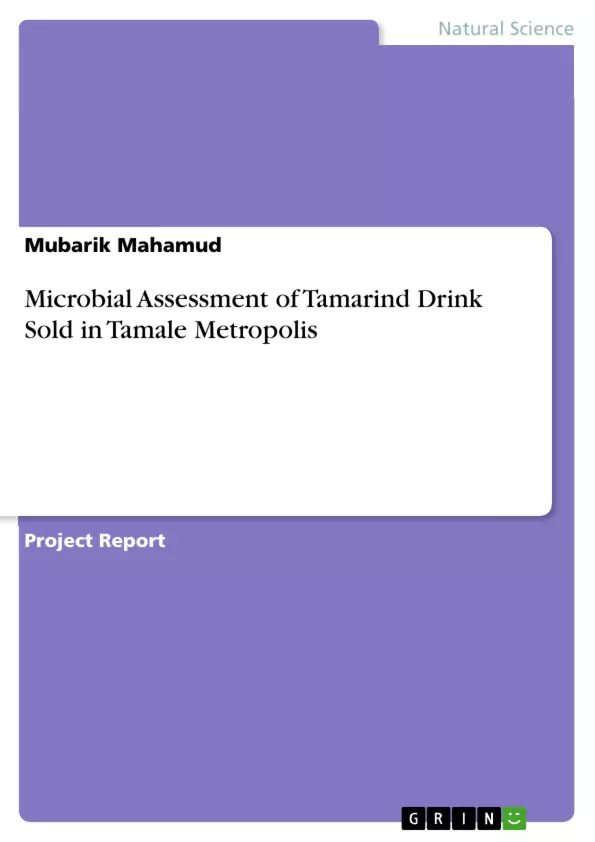Tamarind drink is a local non-alcoholic beverage, mostly processed and sold in Ghana by people of the Dagomba ethnic descend. The drink is a sweet-sour beverage made from the pulp of the indigenous African tamarind tree (Tamarindus indica). It has since ancient times been used for the treatment of inflammations, fevers, and alcohol intoxication. The juice from tamarind is rich in vitamin B3, potassium and is known to have cathartic, astringent, refrigerant, and antiseptic effects. This study seeks to assess the microbial quality of Tamarind drink sold within the Tamale metropolis.
The study will be empirical, involving a total of 30 tamarind drink samples purchased from ten different vendors all over the Tamale metropolis. Using a range of general and specific microbiological media including nutrient agar, MacConkey agar, Potato Dextrose Agar, enumeration of the microbes will be carried out. Colonies will be tested for Gram reaction, and the biochemical assay will be used to confirm morphological characteristics of the colonies following microscopic examination at x400 and x1000 magnifications. Questionnaires will be administered.
Table of Contents
- ABSTRACT
- CHAPTER ONE
- 1.0 BACKGROUND
- 1.1 Introduction
- 1.2 Problem Statement
- 1.3 Justification of the Study
- 1.4 Research Questions
- 1.5 Objectives of the study
- CHAPTER TWO
- 2.0 LITERATURE REVIEW
- 2.2 Classification
- 2.3 Chemical composition
- 2.4 Production and Cultivation
- 2.5 Main Uses of Tamarind Products
- 2.6 Functional Properties
- CHAPTER THREE
- 3.0 METHODOLOGY
- 3.1 Study Design
- 3.2 Study Site
- 3.3 Study Population
- 3.4 Sample Size
- 3.5 Inclusion Criteria
- 3.6 Exclusion criteria
- 3.7 Sampling technique
- 3.8 Sampling and data collection
- 3.9 Sample preparation
- 3.10 Bacteriological analyses
- 3.11 Enumeration and identification of Fungi
- 3.12 Determination of pH and temperature
- 3.13 Data Handling
- 3.14 Statistical Analyses
- 3.15 Ethical clearance
- REFERENCES
- WORK PLAN
- BUDGET
Objectives and Key Themes
This research aims to assess the microbial quality of tamarind drink sold in the Tamale metropolis. The study will analyze microbial contaminants, including pathogens, in tamarind drink samples collected from various vendors. The findings will provide insights into the safety and hygiene standards of tamarind drink production in the area.
- Microbial contamination of tamarind drinks in Tamale
- Hygiene practices in tamarind drink production
- Public health implications of microbial contamination
- Recommendations for improving the safety of tamarind drinks
- Consumer awareness regarding the health risks associated with contaminated tamarind drinks
Chapter Summaries
Chapter One: Background
This chapter introduces the topic of tamarind drink, outlining its cultural significance, production methods, and traditional uses. It highlights the increasing popularity of tamarind drink in Ghana, along with concerns regarding hygiene and potential microbial contamination. The chapter establishes the research problem, emphasizing the need for investigation into the microbial safety of tamarind drink in Tamale.
Chapter Two: Literature Review
This chapter provides a comprehensive review of existing literature on tamarind, its chemical composition, and its uses. The review covers various aspects of tamarind, including its classification, cultivation, production, and functional properties. It also discusses potential health benefits and the importance of ensuring the microbial safety of tamarind products.
Chapter Three: Methodology
This chapter details the research methodology employed in the study. It outlines the study design, sampling techniques, sample preparation, and analytical methods. The chapter provides a clear description of the procedures for collecting and analyzing tamarind drink samples, ensuring the validity and reliability of the study results.
Keywords
The main keywords and focus topics of this research include: tamarind drink, microbial contamination, hygiene practices, food safety, public health, Tamale metropolis, Ghana, pathogenic microorganisms, microbiological assessment, consumer awareness, food regulation.
- Quote paper
- Mubarik Mahamud (Author), 2020, Microbial Assessment of Tamarind Drink Sold in Tamale Metropolis, Munich, GRIN Verlag, https://www.grin.com/document/1439098



